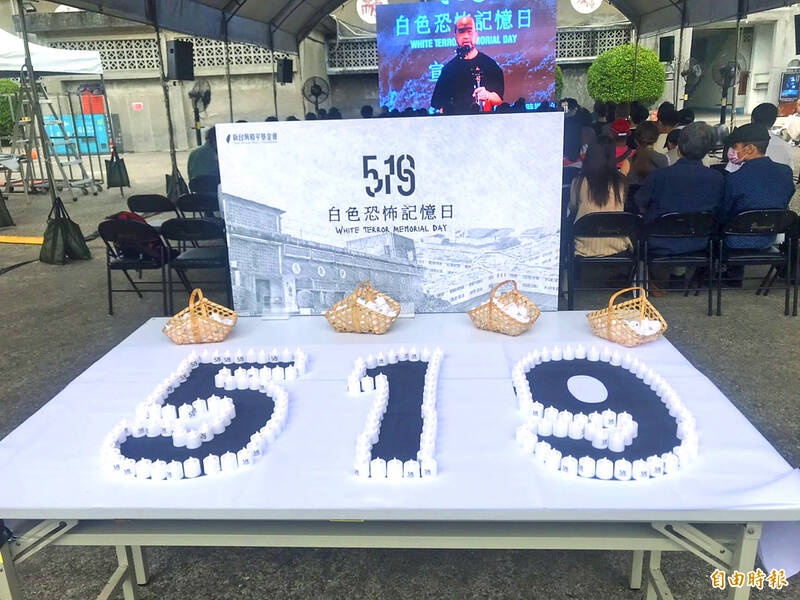《TAIPEI TIMES》 Political prisoners’ properties returned

Candles are placed on a table at the Jingmei White Terror Memorial Park in New Taipei City’s Sindian District to commemorate White Terror Memorial Day yesterday. Photo: Chen Yi-shan, Taipei Times
WHITE TERROR: During the Martial Law era, political prisoners were often charged with the now-repealed Punishment of Rebellion Act, a rights advocate said
By Chen Yu-fu and William Hetherington / Staff reporter, with staff writer
Ten properties worth more than NT$200 million (US$6.21 million) in total that were taken from political prisoners during Taiwan’s White Terror era have been returned to the families of the victims over the past year, a foundation said yesterday.
The White Terror era refers to the suppression of political dissidents following the 228 Incident, an uprising that began on Feb. 28, 1947, which was brutally suppressed by the then-Chinese Nationalist Pary (KMT) regime. The government subsequently imposed martial law, which was lifted on July 15, 1987.
Yesterday was Taiwan’s first White Terror Memorial Day. Outgoing Premier Chen Chien-jen (陳建仁) last month announced that it would be observed annually on May 19.
“The return of confiscated property to the families of political prisoners is an important step toward the restoration of rights,” Restoration of Victim’s Rights Infringed by Illegal Acts of the State During the Period of Authoritarian Rule Foundation chairperson Chang Wen-chen (張文貞) said.
Confiscated buildings and land still registered as state property would be returned to victims’ families whenever legally possible, such as when the properties become vacant or are being rented, she said, adding that in many cases the original owners of the properties were unjustly killed or imprisoned.
The foundation was set up by the Executive Yuan in line with the Act to Restore Victims’ Rights Infringed by Illegal Acts of the State During the Period of Authoritarian Rule (威權統治時期國家不法行為被害者權利回復條例).
Since September last year, when the foundation was established, it has returned 10 properties, Chang said.
Political prisoners who had their property taken during the Martial Law era were often charged with crimes under the now-repealed Punishment of Rebellion Act (懲治叛亂條例), she said.
Article 8 of the Punishment of Rebellion Act stipulated that anyone found guilty of crimes described in it would have their property confiscated, excluding what was necessary to cover the living expenses of that person’s dependent family members.
One property that was returned to a victim’s victim’s spouse and children over the past year was a building in Kaohsiung that was being rented out by the government, Chang said.
The family’s original ownership of the property was confirmed, and the Ministry of the Interior authorized the transfer, she said.
“There was also a really special case of a political prisoner who is still alive and was able to have his property returned to him,” she said. “The man was very young when he was arrested and his property was taken from him. Now he is in 80s.”
Foundation CEO Sun Pin (孫斌) said that during the Martial Law era, confiscated properties would change hands within the government.
After the state confiscated the property it would first be registered to the Taiwan Garrison Command, he said, adding that if the Taiwan Garrison Command did not want to use the property, it would be transferred to the National Property Administration or local government.
In one case, involving writer, human rights activist and former political prisoner Bo Yang (柏楊), books rather than real-estate were confiscated, but were lost, Sun said.
The foundation gave Bo’s family NT$6,000 for the books, he said.
“Although only books were confiscated from Bo Yang, the case has special symbolic significance. The family members believed that everything the country took from Bo should be returned,” he said.
新聞來源:TAIPEI TIMES














